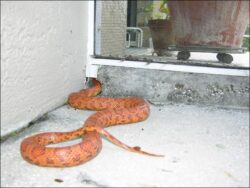Florida is home to diverse wildlife, and snakes play a vital role in maintaining its ecosystems. However, for homeowners, distinguishing between venomous and harmless snakes is critical for personal safety and a harmonious outdoor environment. This guide is designed to help Florida residents identify common snakes in Florida, understand their roles, and appreciate the benefits they bring to your garden.
Common Snakes in Florida: A Guide
Identifying Venomous Snakes in Florida
While most snakes in Florida are non-venomous and pose no significant threat, a few species can be harmful if mishandled. Recognizing these species is essential for cautious interaction. Below are some common venomous snakes you may encounter in Florida:
1. Eastern Diamondback Rattlesnake
The Eastern Diamondback Rattlesnake is perhaps the most recognizable venomous snake in Florida. Known for its distinctive diamond-shaped patterns outlined in yellow, this snake is often found in wooded areas or dry, sandy terrain. Its rattle, located at the end of its tail, serves as a warning signal when it feels threatened.
- Behavior: Typically avoids human interaction but may become defensive if cornered.
- Size: Can grow up to 6 feet in length, making it one of the largest venomous snakes in North America.
2. Coral Snake
With its vibrant red, yellow, and black bands, the Coral Snake can easily be mistaken for the non-venomous Scarlet Kingsnake. To identify a Coral Snake, remember the saying, “Red touches yellow, kill a fellow; red touches black, friend of Jack.” Coral Snakes are reclusive and primarily found in leaf litter or burrows.
- Behavior: Shy and elusive; usually active at dusk and dawn.
- Size: Small and slender, reaching about 2 feet in length.
3. Cottonmouth (Water Moccasin)
The Cottonmouth, commonly called the Water Moccasin, is known for its intimidating behavior and distinctive threat display. It often opens its mouth to reveal a white interior, hence the name “cottonmouth.” These snakes are typically found near water sources like streams and swamps.
- Behavior: Semi-aquatic and often seen basking on logs or swimming in water.
- Size: Can grow up to 4 feet in length.
4. Pygmy Rattlesnake
This smaller rattlesnake species features gray skin with dark blotches and a subtle reddish stripe along its back. While its rattle is quieter than a Diamondback’s, its presence should not be ignored.
- Behavior: Often camouflaged in leaf litter or grassy areas.
- Size: Rarely exceeds 2 feet in length.
By familiarizing yourself with these snakes’ appearances and behaviors, you can better assess situations and act accordingly when encountering them.
Benefits of Harmless Snakes in Your Yard
Not all snakes are cause for concern—in fact, many non-venomous snakes contribute significantly to maintaining a pest-free and balanced ecosystem. Here are a few species of common snakes in Florida that could become valuable allies in your yard:
1. Eastern Indigo Snake
The Eastern Indigo Snake is Florida’s largest non-venomous snake. Its dark blue-black body and iridescent sheen make it easy to identify. These snakes are gentle and often seek refuge in burrows when not actively hunting.
- Role in the Ecosystem:
- Controls populations of rodents, amphibians, and other small animals.
- Competes with venomous species, indirectly limiting their capacity to establish territories.
2. Black Racer
Commonly found in gardens and lawns, the Black Racer gets its name from its slender, black appearance and speedy movements. These snakes are non-aggressive and will often flee when approached.
- Role in the Ecosystem:
- Reduces the presence of insects and small rodents in residential areas.
- Helps control other reptile populations, including smaller snakes.
3. Corn Snake
With its orange body and red blotches edged in black, the Corn Snake, also known as the Red Rat Snake, is another harmless species frequently spotted in Florida. It often resides in barns, old structures, and wooded areas.
- Role in the Ecosystem:
- Plays a crucial role in keeping rodent populations manageable.
- Acts as a natural deterrent for pests that can damage property or crops.
4. Rat Snake
These non-venomous snakes come in various colors depending on the region, but in Florida, they’re often yellow with dark stripes, earning them the name Yellow Rat Snake. They are excellent climbers and often nest in trees.
- Role in the Ecosystem:
- Preys on rodents, birds, and even pests like roaches and beetles.
- Contributes to a more balanced outdoor environment.
Why Harmless Snakes Are Your Garden’s Best Friend
Welcoming harmless snakes into your yard can reduce reliance on pesticides and other chemical treatments. Their natural diet often includes species that are considered agricultural or household pests, such as mice, rats, and certain insects. Additionally, their presence creates a more biodiverse and resilient garden ecosystem.
Coexisting with Snakes
Living in Florida means sharing the landscape with a variety of wildlife, including snakes. Here are some tips to promote coexistence while minimizing potential conflicts:
- Maintain your yard: Keep grass short, remove debris, and trim shrubs to reduce hiding spots for snakes.
- Secure entry points: Check your home for gaps or openings that could allow snakes to enter.
- Avoid provocation: Most snakes will retreat when left undisturbed, so maintaining a respectful distance is often the best approach.
- Use professional services: If you’re unsure about a snake in your yard, contact a pest control expert trained in wildlife management to assist.
Encouraging Snake Awareness and Appreciation
Understanding the differences between venomous and harmless snakes can ease fears and foster appreciation for these creatures. They are not only fascinating parts of Florida’s natural heritage but also critical players in maintaining ecological stability. If you’d like to learn more about effective wildlife management or need assistance identifying snakes in your area, reach out to your local pest control experts.


